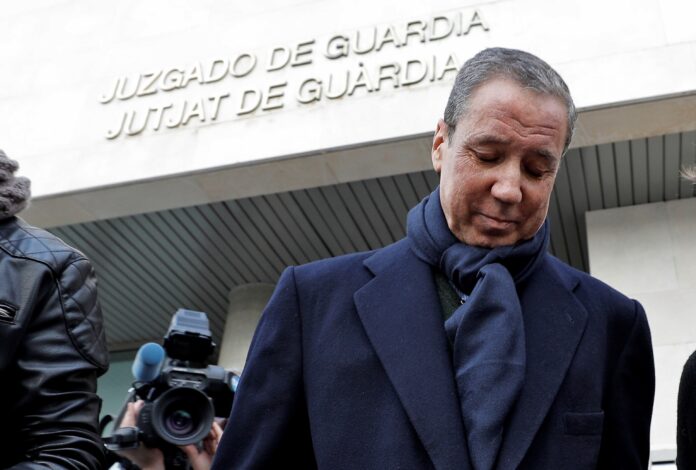The former president of the Valencian Generalitat Eduardo Zaplana has filed an appeal against his prosecution in the so-called Erial case, considering that the investigation has proven that “there is not a single proof that he has accounts abroad” or that he has rigged public contests to collect commissions.
Likewise, the also former ‘popular’ minister stresses that the investigation carried out by the Investigating Court number 8 of Valencia is full of irregularities and that it is based on an “illegal pact” between the Anti-Corruption Prosecutor’s Office and the Uruguayan businessman Fernando Belhot, who admitted having committed a crime by laundering Zaplana funds and has been left out of the case as a result of the aforementioned agreement. To the extent that his condition went from being investigated to being a witness and he has not given a statement in court in the presence of the rest of the lawyers in the case.
“The long investigation practiced”, indicates the brief prepared by the lawyer Daniel Campos, “far from confirming the possible indications that justified the initiation of the case, has served to certify the alienation of my client in relation to the processes of adjudication of the ITV and the wind farms of the Valencian Community and that he was not the owner, authorised, representative or beneficiary of the funds attributed to him abroad”.
According to Zaplana’s appeal, “if the story”, in reference to the car that leaves him one step away from sitting on the bench, “does not describe what the prevaricating resolution is, how can we defend ourselves, deny its existence or justify its legality? “. “Of course there is no signed resolution, neither in the summary nor outside it, in relation to the ITV or the Wind Plan of the Valencian Community”. “It is not possible for us to glimpse how Mr. Zaplana could have been the author of said crime,” the lawyer Campos abounds.
“We could be told that although he did not subscribe to any prevaricating resolution, he could have been an inducer, a cooperator or an accomplice,” he continues. “But in this case, it would be necessary to identify, at least, the material author induced”, an extreme that has not been carried out throughout the investigations, in the opinion of the defense of the former high-ranking PP official.
In the absence of direct evidence, Zaplana stresses that “the main incriminating evidence” against him lies in the testimony of the Uruguayan Belhot, against whom the court initially issued an international arrest warrant that was annulled after agreeing with the Anti-Corruption Prosecutor’s Office to vary his testimony. initial and accuse the former minister. “This evidence would have been obtained through a means that would be illegal in our Law, as it derives from an agreement that guarantees impunity to an alleged participant,” explains the appeal. “It is not possible in any case in our legal system to grant a punitive benefit consisting of guaranteeing the complete immunity of a person who has allegedly participated in criminal acts.”
Zaplana also fights the element that constituted the origin of the case against him and that was supposedly found by the Civil Guard in one of the searches carried out. Specifically, the so-called ‘Syrian papers’, documents that the former manager of the public company Imelsa said were in his possession after they were delivered to him by a citizen of Syrian nationality who had occupied a flat that had belonged to Zaplana.
According to the Civil Guard, these ‘Syrian papers’ reflected the roadmap for the alleged collection of Zaplana commissions from the Cotino family through their business conglomerate. It is, however, in the opinion of the former Valencian president’s lawyer, “photocopies of some typed documents, with parts crossed out, in which unrelated data appears on alleged companies” from which he completely disassociates himself.
“What is unquestionable is that, from the documents provided, the commission of any crime is not derived,” adds the appeal. But also that Zaplana’s name “does not appear in the seized documents nor does it have any relationship with the companies mentioned.” So “his connection with the documents is built through a bizarre story.”
Not in vain, “the dates of said documents or the date of their printing are after the sale and eviction of the house” that the former high “popular” position occupied. “What difference does it make? The case was to invent a reason that would allow Mr. Zaplana to be investigated and everything was worth to achieve that end,” she adds. Likewise, he recalls that the former manager of Imelsa, Marcos Benavent, has recently changed his statement and in statements to EL MUNDO he has explained that it was the Prosecutor’s Office and the Civil Guard who used him to illegally introduce those documents in the case and stressed that they are neither his or know its origin.
For all these reasons, Zaplana requests that the indictment against him be revoked and the case filed.
Conforms to The Trust Project criteria








